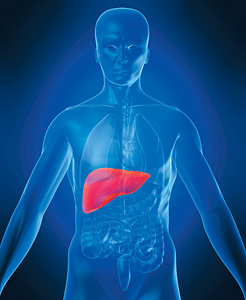Fatty liver disease, known medically as "steatohepatitis," involves inflammation and fat accumulation in the liver. It is often seen in alcoholics, but a form of the condition is also seen in non-alcoholic patients and labelled non-alcoholic steatohepatitis. NASH is also commonly seen in individuals with diabetes, obesity and metabolic syndrome (pre-diabetic state). Both forms of the condition can progress to cirrhosis.
As a point of nutritional interest, a 2006 study suggested that coffee may help reduce risk of liver cirrhosis.2 According to the study authors, some yet-unidentified constituent in coffee helps protect the liver from cirrhosis. This appears to be especially true in alcohol-induced cirrhosis injury. They also note that their study suggests coffee consumption is associated with a reduced risk of primary liver cancer, known as hepatocellular carcinoma (not metastatic liver cancer).2
The Role of Vitamin E
 Updated practice guidelines from the American Association for the Study of Liver Diseases, the American College of Gastroenterology, and the American Gastroenterological Association were released to medical doctors on Aug. 3, 2012.1 According to these latest guidelines, patients with NASH are encouraged to reduce excess body fat and avoid alcohol. One of the surprising recommendations includes providing these patients with 800 IU of vitamin E per day.
Updated practice guidelines from the American Association for the Study of Liver Diseases, the American College of Gastroenterology, and the American Gastroenterological Association were released to medical doctors on Aug. 3, 2012.1 According to these latest guidelines, patients with NASH are encouraged to reduce excess body fat and avoid alcohol. One of the surprising recommendations includes providing these patients with 800 IU of vitamin E per day.
Studies have shown that vitamin E reverses liver cell damage (histological features of liver cells) in cases of NASH. The guidelines state that vitamin E supplementation, therefore, should be considered as a first-line pharmacotherapy for this patient population.
This is a crucial finding, as very few agents have been shown to actually reverse liver damage in cases of non-alcoholic steatohepatitis. As such, vitamin E is one of the interventions most likely to prevent progression to cirrhosis in these cases.1 Of additional note is the recent finding that vitamin E is also associated with reduced risk of liver cancer (hepatocellula carcinoma) in high-risk populations.3
Other Helpful Supplements
Absent from the recommendations from the American Association for the Study of Liver Disease, the American College of Gastroenterology, and the American Gastroenterological Association are other supplements that have been shown to be helpful in cases of NASH and/or alcohol-induced fatty liver disease. The supplements for which there is the strongest evidence include milk thistle – involving a standardized grade of silymarin;4 and trimethylglycine (betaine).5 Other supplements may also be considered in the management of fatty liver disease, based on preliminary results and extensive animal experimentation. The best researched of these include picrorhiza6 and N-actetylcysteine.7-8
References
- The Diagnosis and Management of Non-Alcoholic Fatty Liver Disease: Practice Guideline by the American Association for the Study of Liver Diseases, American College of Gastroenterology, and the American Gastroenterological Association. U.S. Dept. of Health & Human Services, National Guideline Clearinghouse, 2012.
- Klatsky AL, Morton C, Udaltsova N, Friedman GD. Coffee, cirrhosis, and transaminase enzymes. Archives of Internal Medicine, 2006;166(11):1190–5.
- Zhang W, Shu X-O, Li H, Yang G, et al. Vitamin intake and liver cancer risks: a report from two cohort studies in China. Journal of the National Cancer Institute, 2012; epub ahead of print July 17.
- Milk Thistle: Overview. University of Maryland Medical Center: Medical Reference: Complementary Medicine.
- Cirrhosis. University of Maryland Medical Center: Medical Reference: Complementary Medicine.
- Meschino J. "Comprehensive Guide to Picrorhiza." www.meschinohealth.com/books/picrorhiza
- Thong-Ngam D, Samuhaaneeto S, Kulaputana O, Klaikeaw N. N-acetylcysteine attenuates oxidative stress and liver pathology in rats with non-alcoholic steatohepatitis. World Journal of Gastroenterology, Oct. 14, 2007;13(38):5127-32.
- Baumgardner J, Shankar K, Badger T, Martin R. Effects of n-acetylcysteine on non-alcoholic steatohepatitits (NASH) in rats fed via total enteral nutrition. U.S. Dept. of Agriculture, Agricultural Research Service. The Dietary Factors in Early Human Development: Health Consequences of Phytochemical Intake research project.
Click here for more information about James P. Meschino, DC, MS.





